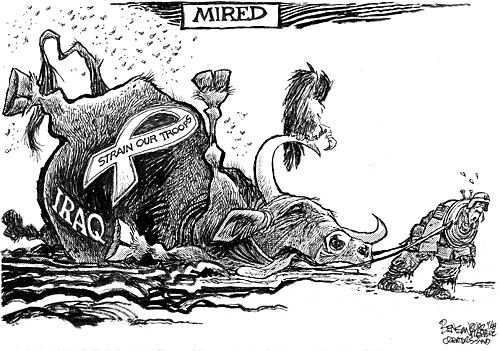Wednesday, April 09, 2008
NYT: Attacks in Baghdad Spiked in March, U.S. Data Show
Attacks in Baghdad Spiked in March, U.S. Data Show
BAGHDAD — After an overall decline in attacks against civilians and American and Iraqi security forces in Baghdad over the past several months, the number more than doubled in March from the previous month, according to statistics compiled by the American military in Baghdad.
The sharp increase in overall attacks, to 631 in March from 239 in February, reflects new strikes against the Green Zone, the heavily fortified headquarters for Iraq's central government and the American Embassy here, as well as renewed fighting in the Sadr City district of Baghdad between Shiite militias and Iraqi government and American forces.
Violence in Sadr City first flared more than a week ago after Prime Minister Nuri Kamal al-Maliki started a poorly coordinated military campaign to retake the southern port city of Basra from Shiite militias. The fighting has had repercussions in other Shiite enclaves across the country, but nowhere is it as severe as in Sadr City.
Nearly all of the increase came in attacks against American and Iraqi security forces, which rose to 562 in March from 177 in February. Attacks against civilians in the capital remained relatively unchanged: 69 in March from 62 in February.
However, another yardstick, the number of civilian deaths tracked by the Iraqi government, shot up last month after several months of decline. Iraqi officials recorded 472 civilian deaths in Baghdad in March, a 43 percent increase over February. That increase is believed to have been caused mainly by battles between security forces and the Shiite militias.
The attack data, which was prepared by the American military division in Baghdad, indicate that despite those clashes, the sectarian violence between Sunni and Shiite groups is still down considerably from the peak levels last summer.
The latest military statistics are not classified and were provided to The New York Times in response to a request for information about the security situation in the Iraqi capital.
The increased violence in Baghdad is likely to figure in Congressional testimony in Washington on Tuesday by Gen. David H. Petraeus, the top American commander in Iraq, and Ryan C. Crocker, the American ambassador here.
Critics of the Bush administration's Iraq policy will probably cite the attack data to argue that the American troop increase in Baghdad has not achieved the hoped-for decline in violence. In recent days, Shiite militias have repeatedly struck the Green Zone, killing American soldiers and civilians there.
But proponents of the current strategy may use the new statistics to argue that security is too unsettled to warrant additional American troop reductions. General Petraeus is expected to recommend a delay in troop withdrawals to reassess security trends after the number of American combat brigades is reduced to 15 in July from a high of 20 during the troop buildup.
American and Iraqi officials have attributed the reduction in violence to the increased American military presence and counterinsurgency operations in Baghdad, Sunni tribesmen who have turned against the insurgency, and a cease-fire that Moktada al-Sadr, the powerful anti-American Shiite cleric, had observed until the Basra offensive.
While the United States and the Maliki government have achieved success in fighting the insurgents, the recent fighting in Basra and Sadr City underscores the point that Shiite militias remain a significant problem.
Mr. Sadr has ordered his militia, the Mahdi Army, not to challenge Iraqi security forces, but American officials say that splinter groups, some backed by Iran, are behind the recent spate of attacks against the Green Zone and American forces. It is not clear if Mr. Sadr has influence over these groups.
American military analysts said Monday that continued fighting in Baghdad threatened to weaken the security gains made so far.
"Much will depend on Sadr and whether his growing attacks on the U.S. for supporting Maliki have pushed him toward open confrontation with the U.S.," said Anthony H. Cordesman, a military specialist at the Center for Strategic and International Studies in Washington.
"What is clear," he said, "is that the intra-Shiite power struggle has only begun, will be violent to some degree, and is likely to intensify through the fall 2008 local-provincial elections, the 2009 national elections and beyond."

